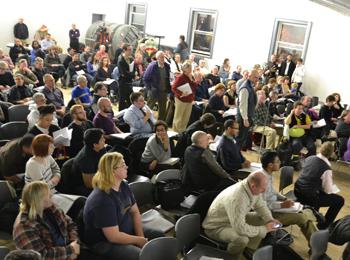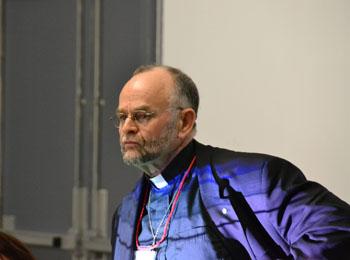
150 people streamed into The 519 to hear the results of the consultations. Credit: Marcus McCann
After months of meetings, surveys, debate and mudslinging, 150 people streamed into the 519 Church Street Community Centre to hear the Community Advisory Panel’s (CAP) report and recommendations. The report is 232 pages and contains 133 recommendations.
Francisco Alvarez, chair of the Pride Toronto (PT) board of directors, earned a standing ovation after telling the crowd that he accepts CAP’s recommendations “wholesale,” at least “in spirit.” Alvarez also gave a heartfelt apology on behalf of the board to the whole community.
The sweeping report covers everything from finances to entertainment. A significant portion of the report is dedicated to repairing rifts between PT, the trans community and people of colour.
The first recommendation is that “Pride Toronto should be saved and its programming considerably downsized.”
“In the short term, the biggest challenge is financial,” CAP chair Brent Hawkes told Xtra before the meeting. He emphasized the precarious position of the organization, which lost more than $400,000 in 2010.
CAP also suggests that PT farm out or hand over aspects of its operations it previously handled on its own. For example, PT should not run beer gardens but should work with groups like The 519 — or local businesses — to produce the weekend’s outdoor drinking spaces.
Among the CAP recommendations is a list of criteria for determining which groups should be allowed into the parade. Queer and non-queer groups will both be allowed to march, but all participants must prominently display pro-gay or trans messages, if the recommendations are adopted.
About 10 of the 232 pages of the report deal with Queers Against Israeli Apartheid (QuAIA). The recommendations stop short of saying whether QuAIA ought to be allowed to march.
Instead, CAP recommends the creation of an adjudication process that would determine whether controversial groups can march. It would be triggered only in the event of a complaint and any decisions made would be final, if the recommendation is adopted.
“There’s a lot of grey area here, and we know it,” admits Hawkes, in reference to the dispute resolution passage.
CAP also recommends that PT devote the bulk of its entertainment programming to acts that are from Toronto and are members of the gay or trans community.
In the short term, PT needs to hire an interim executive director to replace outgoing ED Tracey Sandilands, the report says. PT will also need to replenish the board, which is down to just seven members. CAP recommends that the board’s size be increased and that the majority of the people on the board’s subcommittees be non-board members.
Read the recommendations here…
Community Advisory Panel Report – Executive Summary
Community Advisory Panel Report – Main
Community Advisory Panel Report – Appendices
UPDATE 18 Feb 9:15pm By Matt Mills – As pointed out below by a sharp-eyed reader, this story page originally included an account of the hours leading up to the Feb 17 community meeting at The 519. We inadvertently overwrote that text last night. Here’s the story….
Last week Xtra asked CAP members to release their recommendations sometime prior to the community meeting. It was clear the report was going to be quite lengthy, so it seemed that releasing it early would give people, including Xtra’s editorial crew, the chance to read it in advance and thereby arrive at the meeting informed and ready to ask questions.
CAP didn’t support that idea but did ultimately agree to host a two-hour pre-meeting “embargo” period in which reporters could review the report now posted above. CAP’s conditions for participation included, “Once admitted to the room, no one will be allowed to leave prior to 6:45 pm except in case of a medical emergency.” CAP also required that everyone sign-in and that “media surrender all electronic devices, including cell phones and laptops.”
It was not ideal – it was a regimented system with a seemingly inordinate level of security that implied various classes of gay people with various levels of access and privilege – but it was better than nothing. In the minutes prior to the embargo period, scheduled to begin at 5pm, Xtra learned that there were in fact two rooms at The 519 in use for the task; one was assigned by CAP for media and one was assigned for “invited community leaders.”
Xtra Toronto managing editor Marcus McCann and Xtra Toronto reporter Andrea Houston attended the media room on the second floor. That meeting was invigilated by CAP chair Brent Hawkes and included various reporters from the mainstream press. I’m Xtra’s editorial director and I chose to attend the community leaders meeting on the third floor. I was not invited to that meeting but I felt it was important that Pink Triangle Press and Xtra be represented there. I was also curious about why there were two groups. The community leaders meeting was invigilated by CAP member Douglas Elliott. I was initially denied entry to the room but was eventually admitted.
There were about 20 people in the community leaders room. They included Egale executive director Helen Kennedy, Ward 27 city councillor Kristyn Wong-Tam, University of Toronto associate professor Renaldo Walcott, Queers Against Israeli Apartheid spokesperson Elle Flanders, Kulanu executive director Justine Apple, Carol Pasternak, legislative assistant to Toronto Centre MPP Glen Murray Kajananth Thirunavukkarasu, and several others.
Each person was issued a hard copy of the report posted above, Elliott made a brief introduction, and the balance of the time was spent largely in silent reading. There was no other formalized process or discussion.
Xtra will have more coverage and analysis of the CAP report in the coming days.


 Why you can trust Xtra
Why you can trust Xtra


